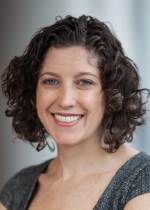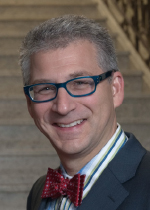
Allison B. Ludwig, M.D. ’04
Two assistant deans have joined Einstein’s office of
student affairs:
Allison B. Ludwig, M.D. ’04, an assistant professor of
medicine (general internal medicine), and
Joshua D. Nosanchuk, M.D., a professor of
medicine (infectious diseases) and of
microbiology & immunology at Einstein and attending physician in medicine at
Montefiore. The office is headed by
Stephen G. Baum, M.D., senior associate dean for students.
They took over last fall from Nadine T. Katz, M.D. ’87, who was senior associate dean for student academic affairs for five years. She is now medical director of Weiler Hospital, on Montefiore’s Einstein campus.

Joshua D. Nosanchuk, M.D.
Both assistant deans maintain busy schedules outside the student affairs office. Dr. Nosanchuk runs Einstein’s Microbiology and Infectious Diseases course and heads a laboratory studying fundamental mechanisms of infectious diseases. Dr. Ludwig, formerly the assistant director of the medicine training program, is an attending physician at
Jacobi Medical Center.
“One of our key roles in the student affairs office is identifying students who may need a boost by offering them some extra guidance,” says Dr. Ludwig, who notes that the office of academic support counseling is within their purview. “We want students to come back in ten years and say ‘Thanks—that was good advice.’ Winning over those students, so they feel comfortable enough to seek our help, is a big challenge.”
Much effort goes into helping students make the crucial career decisions they face in medical school, particularly during their third and fourth years (when, for example, they must choose a subspeciality such as neurosurgery, orthopedics, radiology or urology). At a time when interpersonal contact is yielding to smartphones and computers, Einstein’s academic deans are big believers in the value of face-to-face meetings. So Drs. Ludwig, Nosanchuk and Baum schedule regular consultations with third- and fourth-year students to help them plan their careers. They also respond to the needs of other students, including those in Einstein’s Medical Scientist Training Program.
“We meet several times with each student during his or her time here at Einstein,” says Dr. Nosanchuk.
Mentoring is a key service offered by the student affairs office. “We’re constantly improving our mentoring,” says Dr. Baum. Last fall, for the first time, students could match up with potential mentors listed in a database of Einstein faculty and alumni. “Students may have just one question, or they may be looking for a long-term mentoring relationship. This opens the way,” says Dr. Ludwig.


